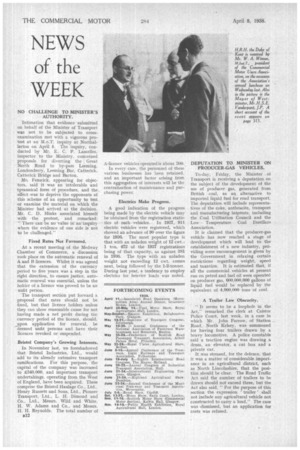NEWS of the WEEK
Page 46

If you've noticed an error in this article please click here to report it so we can fix it.
NO CHALLENGE TO MINISTER'S AUTHORITY.
Intimation that evidence submitted on behalf of the Minister of Transport was not to be subjected to crossexamination met with a vigorous protest at an M.o.T. inquiry at Northallerton on April S. The inquiry, conducted by Mr. E. C. P. Lascelles, inspector to the Ministry, concerned proposals for diverting the Great • North Road to by-pass Leeming, Londonderry, Leeming Bar, Catterick, Catterick Bridge and Barton.
Mr. Fenwick, appearing for objectors, said it was an intolerable and tyrannical form of procedure, and the effect was to deprive the opponents of this scheme of an opportunity to test . or examine the material on which the Minister had arrived at the decision. Mr. C. D. finks associated himself with the protest, and remarked: " There can be no value in an-inquiry where the evidence of one side is not to be challenged."
Fixed Rates Not Favoured.
At a recent meeting of the Medway Chamber of Commerce, a discussion took place on the automatic renewal of A and B licences. Whilst it was agreed that the extension of the currency period to five years was a step in the right direction, to ensure justice, automatic renewal was essential, unless the holder of a licence was proved to be an unfit person.
The transport section put forward a proposal that rates should not be fixed, but that licence holders unless they can show reasonable cause for net having made a net profit during the currency period of the licence, should, upon application for renewal, be " deemed unfit persons and have their licences revoked or suspended.
Bristol Company's Growing Interests.
In November last, we foreshadowed that Bristol Industries, Ltd., would add" to its already extensive transport ramifications. For this purpose, the capital of the company was increased to 2340,000, and important transport undertakings, operating from the West of England, have been acquired. These comprise the Bristol Haulage Co., Ltd., Henry Russett and Sons, Ltd., Pioneer Transport, Ltd., L. H. Dimond and Co., Ltd., Messrs. Wild and White, H. W. Adams and Co„ and Messrs. H. H. Reynolds. The total number of 1312 A-licence vehicles operated is about 300.
In every case, the personnel of these various businesses has been retained, and an important factor arising from this aggregation of interests Will be the centralization of maintenance and purchasing power.
.Electrics Make Progress.
A good indication of the progress being made by the electric vehicle may be obtained from the registration statistics of such vehicles. In 1937, 911 electric vehicles were registered, which showed an advance of 90 over the figure for 1936. The most popular type is that with an unladen weight of 12 cwt.1 ton, 472 of the 1907 registrations being of that capacity, as against 381 in 1900. The type with an unladen weight not exceeding 12 cwt. comes next, being followed by the 1-2-tonnes. During last year, a tendency to employ electrics for heavier loads was noted. DEPUTATION TO MINISTER ON PRODUCER-GAS VEHICLES.
To-day, Friday, the Minister of Transport is receiving a deputation on the subject of the development of the use of producer gas, generated from British coal, as an alternative to imported liquid fuel for road transport. The deputation. will include representatives of the coke, anthracite, transport and manufacturing interests, including the Coal Utilisation Council and the Low Temperature Coal Distillers Association.
It is claimed that the producer-gas vehicle has now reached a stage of development which will lead to the establishment of a new industry, providing some encouragement is given by the Government in relaxing certain restrictions regarding weight, speed and taxation, It is estimated that, if all the commercial vehicles at present run on petrol and fuel oil were operated on producer gas, 000,000,000 gallons of liquid fuel would be replaced by the equivalent of 4,000,000 tons of coal.
A Trailer Law Obscurity.
" It seems to be a loophole in the Act," remarked the clerk at Caistor Police Court, last week, in a case in which Mr. John Farrow, of Station Road, North Kelsey, was summoned for having four trailers drawn by a heavy locomotive. A police constable said a traction engine was drawing a drum, an elevator, a cut box and a private car.
It was stressed, for the defence, that it was a matter of considerable importance in an agricultural district, such as North Lincolnshire, that the position should be clear. The Road Traffic Act said the number of trailers to be drawn should not exceed three, but the Act also said, "For the purpose of this section the expression trailer ' shall not include any agricultural vehicle not constructed to carry a load." The case was dismissed, but an application for costs was refused,






















































































































